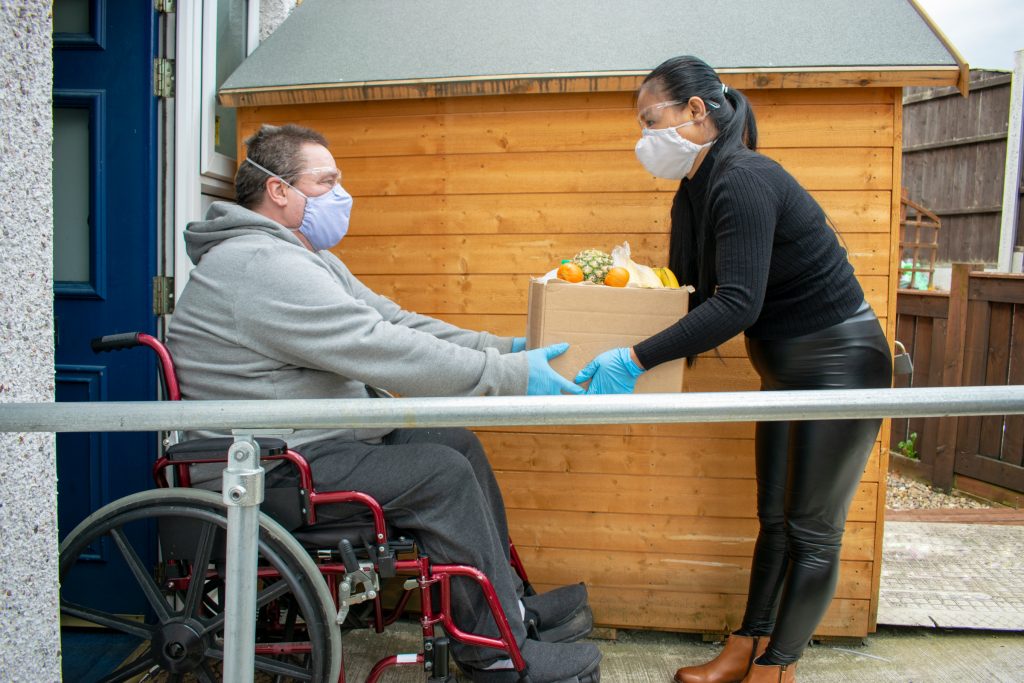By the Ahimsa Fund
– – –
In April 2020, as the COVID-19 pandemic gained momentum, the Ahimsa Fund launched the “Ahimsa Renaissance Movement” initiative, or ARM, as a way to learn from the crisis. It was founded in the belief that COVID-19 must be a starting point for change. Early on, ARM participants committed themselves to hold a series of events on fundamental issues that would highlight the urgent need for change, what it might look like, and how to bring it about.
This specific meeting was a discussion about challenges facing faith-inspired organizations as they respond to COVID-19. The event was Hosted by Jean-François de Lavison, President of the Ahimsa Fund, and Katherine Marshall, Executive Director at the World Faiths Development Dialogue and Georgetown University. There were short presentations from faith inspired organisations about how their work has been affected by the need to respond to the pandemic; these came from Caroline Dalabona of Pastoral de Criança in Brazil; Agus Samsudin of Muhammadiya in Indonesia; and Vinya Ariyaratne of Sarvodaya in Sri Lanka. Three Fellows of the ARM Fellowship participated: Tanvi Sapra (India), Ezekiel Boro (Senegal) and Amish Laxmidas (Portugal). They took the opportunity to contribute to the discussion.
– – –

The FIOs and Their Work
Pastoral de Criança, an institution linked to the Catholic Church, trains volunteers in poor communities to support pregnant women and children up to the age of six, working through regular home visits to provide guidance on health, nutrition, hygiene, childhood development and other issues. This work had to be adapted when COVID-19 made home visits impossible, a challenge met mainly by increased use of mobile phones and other techniques to maintain contact with families that need help. The pandemic significantly reduced the number of children and families receiving direct support and the number of volunteers available; in response, the organisation has increased the use by volunteers of their Home Visits mobile phone app. The app contains resources and e-training on nutrition, health and child development, along with COVID-specific information from reliable sources like WHO and the Ministry of Health and advice on dealing with misinformation. It can be used offline, requiring an internet connection only to download it and for occasional syncing.
Muhammadiya, an Islamic NGO that started in 1912, now runs 107 hospitals and over 250 clinics around Indonesia, as well as 130 universities, over 10,000 schools, and a similar number of kindergartens. Its initial response to the pandemic was to launch a COVID-19 Command Centre to carry out high priority short term tasks like supporting hospitals in pandemic response and deploying education and communication teams to communities in cooperation with organisations such as WHO and USAID, and private companies like Unilever. Pandemic response activity to date has fallen into two separate streams: the immediate response to urgent requirements, including provision of 500,000 basic needs packages to communities; and longer-term work on economic empowerment initiatives to mitigate the pandemic’s economic impacts. These have been supplemented with education programmes around COVID-19 and vaccinations.
Sarvodaya, a community development in Sri Lanka, originated in the 1950s, growing out of a holistic view of development inspired by Buddhist teachings and philosophy. COVID-19 obliged Sarvodaya to diversify into new activities, including working to meet people’s basic needs during lockdowns. Other than resource constraints that hindered an immediate large-scale response, one major challenge – shared with many other faith inspired organisations – has been the day-to-day reliance on volunteers who themselves are heavily restricted by the pandemic. In addition, the Sri Lankan national response has been state-centric and centralised, with only limited possibilities for civil society organisations to participate. All these difficulties notwithstanding, Sarvodaya was able to look after the most vulnerable in the first phase, then to move to an integrated phase of working with religious and community leaders on COVID prevention, providing risk communication material based on faith teachings of all national religions. For the purposes of longer-term recovery, Sarvodaya is attempting to enhance faith based risk communication and community engagement by examining the basic teachings of different religions around disease prevention and recovery, taking a creative approach to finding in-depth teachings in scripture and practice that can be applied to pandemic prevention and recovery.
These examples underline the many possible interpretations of the word “inspired” and their practical applications. The links between faith inspired organisations and the faiths themselves can be complex and subtle. They are not by any means always direct: faith may colour these organisations’ approaches and how they mobilise volunteers, but may not be something they wish to wear on their sleeves.
Faith-Based Responses to COVID-19 and the Problem of Inequality
In March 2020, early in the pandemic, Georgetown University’s Berkley Center and the World Faiths Development Dialogue started a systematic effort to follow the pandemic responses of faith organisations and communities around the world. Past experience highlights that religious themes and actors are central to responses to epidemics, including those of HIV, malaria, Ebola virus disease, Zika and others; but the lessons of their involvement are often not clearly and effectively taken into account. This can be for many reasons. Sometimes, faith inspired activities in health are simply not part of traditional systems, so remain poorly known and understood. At other times, the picture can be more complicated, taking in the effects of mis- and disinformation, mistrust in certain contexts of anything that has to do with religion, and an unwillingness to look in depth at complicated, community-based interventions. There is, therefore, a need for professional, thoughtful, evidence-based creative efforts to draw conclusions that paint a clear picture of the lessons, good and bad, of faith inspired interventions. There is a host of professional, well established, creative organisations around the world that have vision and understanding of community priorities and vulnerabilities – properly harnessed they are an important gift not only to pandemic response, but also to almost all aspects of development and health care provision.
There has been much discussion about how COVID-19 has highlighted existing inequalities throughout the world, including those inherent in huge healthcare disparities. While some insist that the pandemic is a great leveller that puts us all in the same boat, Katherine Marshall chose the metaphor of a storm: parts of it are unpredictable, it hits some areas harder than others, it shifts and moves continually, ebbing and flowing, and people navigate it in very different kinds of vessels. Those in the metaphorical yachts and ocean liners are even managing to profit from it – it is extraordinary how much some of world’s wealthiest have increased their fortunes during the pandemic. Meanwhile, those less protected are in tiny boats, or clinging to driftwood, or drowning and losing all they have – not least hope.

The World Faiths Development Dialogue/Berkley/Joint Learning Initiative project is looking to the best in religion and faith inspired responses as part of an effort to help ensure the world does not forget those who suffer and those who are neglected. Doing this systematically is not easy, but the project has succeeded in generating evidence for an important story, including over 100 pages of links, a weekly analysis of experiences from faith inspired responses, collections of lessons, guidance, videos and more [link to repository and to broader project]. These resources include information about the kinds of adaptations to existing programmes described by the three opening speakers, showing how organisations have been forced to change their modes of operations to provide education and care for the vulnerable in the pandemic.
The responses that have been collected and analysed fall into six main categories:
- Messages about health care, adapted to community needs and building on trust
- The less visible, more complicated task of trying to meet the needs of vulnerable communities — a huge and varied job that at different times must encompass responses to hunger, loss of jobs and housing, health, mental health issues, domestic violence, the needs of children left without parents or caregivers, and the broader questions of social protection
- The issue, common to every pandemic, of scapegoating of particular groups—something that is done both by and to religious communities
- The interrelationships between COVID-19 and ongoing conflict situations
- The impact of the pandemic on relationships between governments and religious institutions – something that may be a major area of activity and change in the future, particularly given the impact on religious communities of some of the social restrictions imposed as part of the pandemic response
- Work to analyse and prepare for how we can do better when we emerge from this period –an area of focus for many organisations, including Ahimsa.
Looking Ahead
There will be much more to come, and no doubt many future Ahimsa calls, on the unique strengths of faith inspired organisations. Not only is there no immediate end in sight to the pressures of the pandemic itself, or the associated lockdowns and other measures and their health impacts, but there is also the vexed challenge of the worldwide vaccination effort. The drive to vaccinate has brought with it many issues. If it is to help bring this crisis to an end, it will require the best of the faith community’s insights, contacts and volunteers.
There are three main areas in which this is likely to be the case. The first is what Tedros Adhanom Ghebreyesus, Director General of WHO, has called the “moral catastrophe” of gross inequalities in current allocations and deliveries of vaccine supplies, and the need to apply sound ethical principles to future allocations. Then, once vaccines start to arrive, there will be the enormous logistical challenge of the campaigns themselves, of which many faith inspired organisations– with their deep community routes and well established networks – are likely to be an important part. Finally, there is the overarching need to deal with mis- and disinformation, and to contribute to positive, open, trusted communication on why COVID-19 countermeasures are important and how they should be applied. Questions around new vaccinations, founded in some communities on very understandable historical distrust of medical establishments, will be rife; faith inspired organisations are in an especially privileged position to help dispel fears and find ways to counter bad information.
One obvious comment, often repeated, is that an effective response to COVID-19 – or indeed any other large complex health or development problem – requires all of us who participate in it to break down long standing siloes and work together in new ways; but the reality of achieving that is complicated, and varies from place to place. In this pandemic alone, some contexts have provided heartening stories of different communities’ willingness to work together; but others have shown how tensions between groups can rise when people are afraid and uncertain. The rise of vaccine nationalism, for example, has been a selfish and unedifying spectacle, far removed from the kind of altruism that most of us would like to see.
It is an aspiration held by many that this pandemic will force us into a greater recognition of common interest; but we should never blind ourselves to the realities of the tensions that it exacerbates. In these particularly difficult situations, organisations rooted in faith, in communities and in the beliefs that hold them together may be uniquely well placed to find positive pathways out. You can access the recording of the conference here.
– – –
Through innovative models, Ahimsa Fund aims to develop new leadership and forums for exchange, where everyone benefits from interacting with others and where everyone can contribute to this change. Ahimsa works in different regions of the world with a network of high level partners, developed for more than 40 years.


